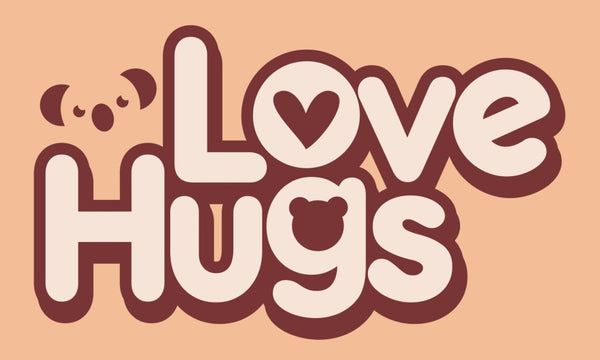It's well-known that children with autism, ADHD, and anxiety often struggle with sensory processing challenges that can overwhelm ordinary situations. Sometimes, they only need a calming hug to help alleviate stress and anxiety. However, finding an effective and convenient solution can be a challenge in itself, especially when standard comfort items like blankets may not provide optimal results. This is where weighted cuddle toys come in—and LoveHugs is dedicated to offering the perfect solution. This article will explore the incredible sensory benefits of weighted cuddle toys for children with autism, ADHD, and anxiety.
Weighted toys, also known as sensory cuddle toys or comforters, have been carefully designed to provide a soothing and calming effect on children who struggle with sensory processing challenges. They work by applying gentle pressure to the child's body, mimicking the sensation of a hug, and can help regulate the nervous system, reduce anxiety, and improve focus. With LoveHugs' soft and cuddly design, these therapeutic toys provide a great source of comfort for children needing a reassuring touch.
In the following sections, we will delve deeper into the unique features of weighted cuddle toys and their fantastic sensory benefits for children with autism, ADHD, and anxiety. We'll discuss the science behind the calming effect of deep pressure, the importance of texture and fabric choices, and tips for choosing the perfect LoveHugs to suit your child's individual needs. Keep reading to discover how weighted cuddle toys can become a valuable addition to the lives of those you love most.
The Science Behind the Calming Effect of Weighted Cuddle Toys
Understanding the science behind weighted toys can help us appreciate why they are indispensable therapeutic tools for children with autism, ADHD, and anxiety. The calming effect of these toys is primarily attributed to a phenomenon known as deep pressure touch (DPT) stimulation. Often described as a firm hug or slow, steady squeeze, DPT has been found to help decrease the "fight-or-flight" response and increase the production of serotonin and dopamine. These two neurotransmitters contribute to relaxation, calm and overall well-being.
Children with sensory processing challenges are prone to episodes of anxiety, meltdowns, and difficulty focusing. The comforting embrace of a weighted cuddle toy can effectively reduce these behaviours, promoting self-regulation and balance in their daily lives. By incorporating sensory integration into its products, LoveHugs aims to improve the emotional and sensory experiences of children facing these challenges.
Choosing the Right Texture and Fabric for Your Child's Weighted Toy
In addition to the soothing effects of gentle pressure, the texture and fabric of a weighted cuddle toy are equally important factors to consider. Children with sensory sensitivities may have specific preferences regarding the materials they interact with. LoveHugs recognises this need and offers toys made of soft, cuddly fabrics, ensuring that the toys provide the utmost comfort and satisfaction.
Consider the child's sensory needs when purchasing a weighted companion for children who derive pleasure from very specific textures, such as fur, fleece, or satin.
Integrating Weighted Toys into Your Child's Daily Life
One of the most significant advantages of weighted cuddle toys is their versatility and adaptability to various situations. Here are some practical suggestions for integrating your child's weighted companion into their daily routine:
1. Bedtime: Place the weighted toy on your child's lap or chest while they rest in bed. The gentle pressure from the LoveHugs can create a sense of security, leading to a more restful night's sleep.
2. Travel: Long car or plane journeys can be challenging for children with sensory sensitivities. Having a weighted toy to hold onto can help them feel calmer and more grounded during the trip.
3. Therapy sessions: Introducing a weighted cuddle toy during a therapy session can aid in managing anxiety and promoting emotional regulation, allowing your child to benefit more from the session.
4. Quiet times: Many children with sensory processing challenges require regular quiet breaks throughout the day to help calm their nervous system. Encouraging them to cuddle with their weighted toy during these times can provide a safe space for relaxation and recharging.
Conclusion
Weighted cuddle toys can dramatically transform the lives of children with autism, ADHD, and anxiety by providing a portable, comforting, and therapeutic companion that caters to their specific needs.
Investing in a weighted toy is an investment in your child's emotional well-being, independence, and sensory development, making them an essential tool for any family navigating the challenges of sensory processing disorders. LoveHugs' weighted plush toys provide the perfect match for your child and experience the remarkable sensory benefits of these cuddly companions.
Why not try LoveHugs weighted therapeutic sloth soft toy?
LoveHugs are weighted therapeutic soft toys specially designed to hug you back.
Due to their heavier weight than regular soft toys at 1.5kg and unique weight distribution, they harness the power of weighted pressure to help reduce stress and anxiety, provide a calming presence, and help with sleep.
The benefits of weighted blankets are well known. Our product provides a more portable and emotionally comforting alternative which can be used for travel, bedtime or any time and place where a calming hug is needed.
LoveHugs products are small and light enough to be ideal for children and teens, but are also perfect for adults who need a comforting hug too. We have sold thousands of products across Europe, and they are loved by all age ranges.
Click here for more information.


